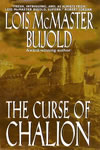The Curse Of Chalion
When The Paladin of Souls, the second book of the series that begins here, won this year's Hugo, I though I should read it. TEKKA wants to buy science fiction, my own reading was in a rut, I once loved a lot of science fiction, and the Cramer/Hartwell anthologies always contain some nifty little stories.
That this book is long and predictable is not a criticism but a genre description. It's a fable grown up and freshly polished, and Bujold does the job expertly and thinks things through. A noble but desperately impoverished courtier at the end of his resources is appointed tutor to a princess of a troubled kingdom. The princess is soon beset by intricate, devious, and deadly conspiracy. It's a good setting.
I think it would be fascinating to hear Bujold and Robert Coover discuss the making of literature from fairy tales. Sparks would fly. Readercon, take note.
But why, exactly, is this a fantasy? After Tolkien, yes, we're tempted to reach for fantasy when we need kings and princes, but Chalion could slide very nicely into the Balkans, or the pre-Ottoman East, or (for that matter) into medieval Italian cities on which is seems to be most closely modeled. Bujold, to be sure, does interesting work with a religion in which the Trinity is replaced by the Four Seasons augmented by The Bastard, and clearly she's interested in a world where religion is real , where gods and ghosts exist. There's nothing she says about The Daughter, though, that mightn't have been said about Mary somewhere in the 12th or 13th century, and the abilities and limitations of the divine when intervening in temporal affairs were certainly topical then.
It's a fine book. For two weeks, I returned home at night and looked forward to spending some time with the Castillar dy Cazaril.
